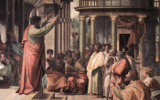Sunday School Lesson
|
Keep the Fire Burning "Now Moses kept the flock of Jethro his father in law, the priest of Midian: and he led the flock to the backside of the desert, and came to the mountain of God, even to Horeb. And the angel of the LORD appeared unto him in a flame of fire out of the midst of a bush: and he looked, and, behold, the bush burned with fire, and the bush was not consumed. And Moses said, I will now turn aside, and see this great sight, why the bush is not burnt. And when the LORD saw that he turned aside to see, God called unto him out of the midst of the bush, and said, Moses, Moses. And he said, Here am I. And he said, Draw not nigh hither: put off thy shoes from off thy feet, for the place whereon thou standest is holy ground." -- Exodus 3:1-5 Posted by Joey Kelly Thinking back, most sermons I've heard on this passage focused on God's holy ground and on Moses being required to go barefoot on it. Isaiah in his vision saw the Lord high and lifted up, and he was undone in the presence of our holy God, as I'm sure Moses also was. Those are certainly good sermons to hear over and over again, but I would like to look instead at the bush that burned yet was not burnt up. Wood, hay and stubble symbolize humanity and his works that will shortly be flamed and revealed, yet God speaks from within the fire and apparently from the bush. How can this be? A quick run through the tabernacle described to Moses in the latter part of his book shows us that it wasn't constructed with just gold, silver (and brass or copper) and precious stones, but also of wood, skins and other perishable materials. Several of the pieces of furniture (the brazen and golden altars and the ark of the covenant) were fashioned out of an indestructable wood (shittim or acacia, which is similar to cedar and resists rotting and repels various insects) overlaid or covered with metal. The brazen altar symbolized Calvary (Isaiah's coal came from this altar), the golden altar was for prayer and praise and the ark of the covenant with the mercy seat represents perfect communion with God. Inside that ark there was placed a pot of manna, Aaron's rod that budded and the two tablets of the law (Hebrews 9:4), depicting the triune nature of God. Through Christ we can approach the throne of God, and the tabernacle and its various parts are one type after another, all pointing to our redeemer Jesus Christ. In particular, the brazen altar, with its wood overlaid with brass, foreshadows the man Jesus Christ overlaid with the judgment of God, when He was nailed to the cross for our sins: and the LORD hath laid on him the iniquity of us all(Isaiah 53:6). The priests were commanded to offer a twice-daily sacrifice upon this altar and the fire that consumed these lambs was supposed to be kept burning continually. The comparison to the bush that Moses encountered, in my mind, is easy to see. Another piece of furniture in the tabernacle was the golden candlestick with his shaft and six branches, made of one large lump of gold that was beaten into shape. That lamp was to be kept burning continually and was in fact the only light in the holy place ( I am the light of the world, John 8:12). Its wicks burnt olive oil and had to be trimmed often. This shows us our need for daily bible reading and the correcting work of the Holy Spirit in our lives. If we want to let our little light shine as Gideon's army did when they broke those pitchers (Judges chapter 7), our wicks must be trimmed and our lamps must be full of oil. Trimming, pruning, purging and suchlike is often uncomfortable and even unbearable at times, yet if we want to bear fruit for the Lord we have to be pruned according to John 15:1-6. If we as His disciples neglect our lamps we may end up like the five foolish virgins when He comes back for the church. So what of it, then? Paul exhorted us I beseech you therefore, brethren, by the mercies of God, that ye present your bodies a living sacrifice, holy, acceptable unto God, which is your reasonable service. And be not conformed to this world: but be ye transformed by the renewing of your mind, that ye may prove what is that good, and acceptable, and perfect, will of God(Romans 12:1-2). Both he and Jesus told us to forsake ourselves and die to self: I protest by your rejoicing which I have in Christ Jesus our Lord, I die daily. Thou fool, that which thou sowest is not quickened, except it die(1 Corinthians 15:31,36). We can know the Lord as Moses did and commune with Him on holy ground if we mind our wicks and walk in the Spirit as Galatians 5:18 tells us. God can and will speak to us again out of the midst of the burning bush, which is Christ. It is only in Him that we live and move and have our being. |
